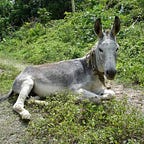Algorithms and Super-Consciousness
The matters of the mind can be the toughest to comprehend, especially if they have never been experienced firsthand. So, it’s one thing to read about the three states of mind: the conscious, the subconscious and the super-conscious and a completely different thing to fully appreciate the full import of the distinction. While a layman can appreciate the conscious and subconscious states of mind, most people will never achieve the super-conscious state in their lifetimes. But just because something is not comprehensible or achievable by a vast majority of the people, does that mean it doesn’t exist?
Accurate descriptions of the state of super-consciousness can be hard to come by. One way of describing it is the realization of “oneness” with the life-force that governs the universe and rising above one’s own identity of “self”. Its physical genesis is supposed to lie in the incremental rise of nerve currents across the various nerve centers (or chakras) located across the spine until the nerve currents finally reach the top-most chakra situated at the seat of the brain.
As one can imagine, the vague and subjective description of the super-conscious state does not inspire a lot of confidence in its existence. However, there have been a number of yogis, rishis and mystics who claim to have reached that state and there exists a wealth of literature on how to attain it. In light of this material and evidence in front of us, wouldn’t it be more prudent to be at most skeptical about the state of super-consciousness rather than being completely dismissive of it, as most people are under the garb of “science”?
To take an analogy, I think a lot of people who have experience with competitive/algorithmic programming would relate when I say that there are times when one could spend an entire day on a problem and still not be able to come up with a solution. No matter how hard one thinks, a solution to the problem at hand appears impossible. In that moment, the problem remains beyond our mental faculties.
But there exists a solution nevertheless. And multiple people have solved it before us. Could it be the same with super-consciousness? That right now, at this moment, it’s beyond our mental faculties, but given more time, we would be able to reach there. Could it be that the rishis and the yogis are the figurative equivalents of the several successful algorithmic problem solvers before us? Isn’t it a bit rich on our part to label something which we don’t yet understand as philosophical garbage when our tiny minds regularly falter at the altar of a simple dynamic programming problem? Surely, if super-consciousness exists, it must require an effort that is exponentially larger than the effort required to solve a leetcode problem. So, in the absence of an argument that disproves the existence of super-consciousness entirely, wouldn’t treating it with the skepticism of a scientific mind, a better approach to take? Maybe, someday, just like it happens so often with algorithmic problems, we will be blessed with that mental leap that takes us into the realm of super-consciousness only if we keep up the efforts.
